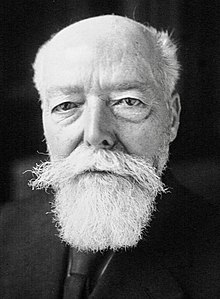Paul Doumer
| Paul Doumer | |
|---|---|
 |
|
| President of the French Republic | |
|
In office 13 June 1931 – 7 May 1932 |
|
| Prime Minister |
Pierre Laval André Tardieu |
| Preceded by | Gaston Doumergue |
| Succeeded by | Albert François Lebrun |
| Personal details | |
| Born | 22 March 1857 Aurillac, France |
| Died | 7 May 1932 (aged 75) Paris, France |
| Political party | Radical Party |
| Alma mater | University of Paris |
Joseph Athanase Gaston Paul Doumer, commonly known as Paul Doumer (French pronunciation: [pɔl dumɛːʀ]; 22 March 1857 – 7 May 1932) was the President of France from 13 June 1931 until his assassination.
He was born in Aurillac, in the Cantal département, in France on 22 March 1857. Alumnus of the Conservatoire National des Arts et Métiers. He became a professor of mathematics at Mende in 1877.
In 1878 he married Blanche Richel, whom he had met at college. They had eight children, five of whom were killed in the First World War (including the French air ace René Doumer).
From 1879 until 1883 he was professor at Remiremont, before leaving on health grounds. He then became chief editor of Courrier de l'Aisne, a French regional newspaper. Initiated into Freemasonry in 1879, at "L'Union Fraternelle" lodge, he became Grand Secretary of Grand Orient de France in 1892.
He made his debut in politics as chef de cabinet to Charles Floquet, when Floquet was president of the chamber in 1885. In 1888, Doumer was elected Radical deputy for the department of Aisne. Defeated in the general elections of September 1889, he was elected again in 1890 by the arrondissement of Auxerre. He was briefly Minister of Finance of France (1895–1896) when he tried without success to introduce an income tax.
He was Governor-General of French Indochina from 1897 to 1902. Upon his arrival the colonies were losing millions of francs each year. Determined to put them on a paying basis he levied taxes on opium, wine and the salt trade. The Vietnamese, Cambodians and Laotians who could or would not pay these taxes, lost their houses and land, and often became day laborers. He established Indochina as a market for French products and a source of profitable investment by French businessmen. The Long Bien Bridge was built during his term as Governor-General and was named for him. It became a well-known landmark and target for US pilots during the Vietnam War.
...
Wikipedia
